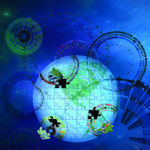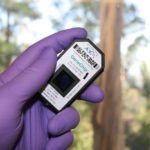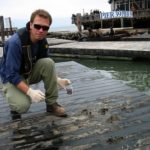Numerous Biosciences Area personnel are among the 2021 Berkeley Lab Director’s Awards honorees. This annual program recognizes outstanding contributions by employees to all facets of Lab activities. A complete list of winners can be found here. The 10th annual Director’s Awards ceremony will take place on November 18 at noon.
From the Molecular to the Mesoscale: The EcoPOD Provides A New Way to Link Plants, Soil, and Microbes
On May 25, Berkeley Lab and Biosciences Area leadership officially welcomed the EcoPOD to its home at Potter Street in West Berkeley. The Lab’s Deputy Director for Research Horst Simon and Associate Laboratory Director for Biosciences Mary Maxon opened the doors of the EcoPOD after Maxon cut the ceremonial ribbon.
JGI Leads Large-Scale Effort to Develop a Genomic Catalog of Earth’s Microbiomes
Microorganisms play key roles in regulating global nutrient cycles but only a small fraction has been identified and an even smaller number has been successfully cultured in a lab for study. In Nature Biotechnology, the known diversity of bacteria and archaea has now expanded by 44% through a publicly available collection of more than 52,000 microbial genomes from environmental samples. Of that number, 70% of the novel genome sequences were previously unknown, not yet cultured in the lab. The work results from a JGI-led collaboration involving more than 200 scientists around the world, KBase and NERSC. Read more about the genomic catalog of Earth’s microbiomes on the JGI website.
PhyloChip Provides Clarity Amid Hawaiian Water Contamination Concerns
To better understand the cause of high counts of potentially pathogenic fecal indicator bacteria (FIB) in the watersheds of the Mahaulepu Valley and Waikomo Stream in southeast Kauai, the Hawaii Department of Health (DOH) commissioned a study by Berkeley Lab microbial ecologists Gary Andersen and Eric Dubinsky. The duo is frequently invited to lead microbial water assessment projects thanks to their expertise and the PhyloChip, a credit card-sized microbial detection technology invented by Andersen and others at Berkeley Lab.
Biosciences Researcher Helps Map the Microbiome of Everything
The Earth Microbiome Project is a massively collaborative effort to characterize all microbial life on the planet. Representing Berkeley Lab, Eric Dubinsky, a guest scientist working with Gary Andersen in EGSB, as well as Neslihan Tas and Shi Wang in the Climate & Ecosystems Science Division (EESA), were among the more than 300 scientists from 161 institutions worldwide to participate in the project. Dubinsky contributed 124 soil samples and metadata he collected from Hawaii. A meta-analysis of all the microbial community samples collected thus far was published Nov. 1 in Nature. This multi-scale reference database gives global context to DNA sequence data and provides a framework for incorporating data from future studies.
Was this page useful?








